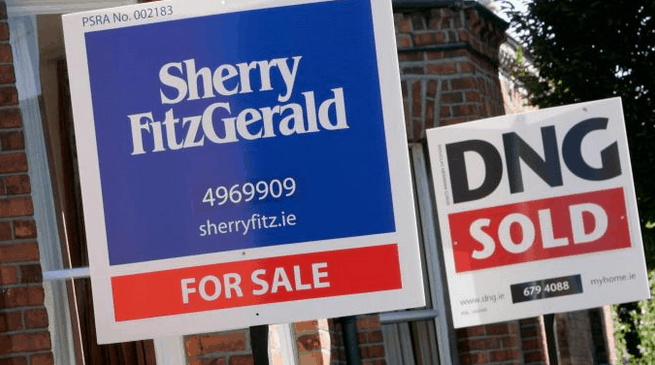A new mortgage option is set to shake up the market here as it offers Ireland’s first 20-year fixed-rate mortgage, providing a massive boost for the struggling property market.
Finance Ireland is launching a range of competitive long-term fixed-rate loans with rates for a 20- year fixed term mortgage ranging from 2.4% to 2.99% for up to 90% loan-to-value mortgages.
And best of all, the non-bank lender is backed by taxpayer cash, as the State-owned Strategic Investment Fund has a 30% stake in Finance Ireland.
The welcome move will pile pressure on banks to offer more competitive mortgage rates, something that is seen as a major boost for homebuyers.
The new cut-price rates would see homeowner repayments of just €1,052 a month on a €270,000 30-year mortgage with the first 20 years fixed at 2.99%.
Finance Minister Paschal Donohoe was not involved in the decision to back the deal but a spokesman said yesterday: ‘The Department [of Finance] welcomes the announcement which provides a new product for customers and will help to drive competition in the mortgage market.’
It came as President Michael D. Higgins yesterday became the latest to comment on the country’s housing crisis, saying that ‘radical solutions’ are ‘urgently needed given the magnitude of a housing crisis that is not abating’.
Reports published this week highlight a chronic shortage of properties that have resulted in soaring house prices while rents continue to skyrocket.
The historical new low 20-year fixed-term home loan was hailed by housing campaigners last night as welcome news for families struggling to get on the property ladder, saying other banks are sure to follow suit.
The announcement was a ‘good news day for new and existing mortgage holders’, Association of Irish Mortgage Advisors chairperson Trevor Grant said.
Currently, the longest fixed-rate mortgage available in the Irish market is seven years – with a handful of providers offering a ten-year term but capped at an LTV of 80%. The Finance Ireland fixed rates are available for up to 90% LTV mortgages.
Rachel McGovern, director of financial services at Brokers Ireland, said: ‘That they are only now entering the Irish market indicates just how staid, unimaginative and, above all, non-consumer-friendly the Irish mortgage market has been. In fact, ten-year mortgages have only been introduced in recent years.’
Joey Sheahan, head of credit at MyMortgages.ie, said: ‘This news from Finance Ireland is really likely to shake things up – both in terms of how mortgage-holders approach their choice of term and rates, and in the fact that if the demand for these products are strong, other lenders will make moves to bring similar offerings on stream.’
The new lender is offering European-style home loans fixed for 20 years from as low as 2.6%.
Its arrival is sure to be welcomed by borrowers after recent announcements by KBC and Ulster Bank that they are pulling out of the Irish banking market.
Finance Ireland chief Billy Kane said: ‘I’ve been involved with the Irish mortgage market for over 30 years and I believe that this is one of the most significant innovations made here in that time.
‘We’ve been working on the introduction of longer dated fixed-rates for some time now in order to allow customers benefit from the historically low interest rates now available. These fixed terms, combined with flexible features, provide exceptional certainty for customers and are a stated priority of the Government.
‘We only distribute our mortgages through regulated intermediaries which ensures that all of our customers have advice about the suitability of any product to their specific needs.’
A spokesman for the Ireland Strategic Investment Fund (ISIF) said: ‘All ISIF investments are made on a commercial basis, in line with its double bottom line mandate of generating a commercial return and supporting economic activity and employment in Ireland. The announcement of new mortgage products today is a result of a commercial decision by the management of Finance Ireland, in which ISIF holds a minority shareholding.’
The maximum term of 20 years is twice as long as currently on offer in the mortgage market and will mean some home-buyers may be able to have a fixed rate for the full term of their mortgage.
The fixed-rate terms launched yesterday are for periods of ten, 15 and 20 years.
The fixed rates range from 2.40% to 2.99% depending on loan-to-value and the fixed-term period.
A 20-year fixed-rate mortgage for up to 90% of the value of the home is priced at just 2.99%.
Customers can also move their mortgage to a new property during the term of the fixed rate without incurring any penalty, can pay back a lump sum of up to 10% of their outstanding balance, without penalty, in each year of the fixed term.
Trevor Grant, of the Association of Irish Mortgage Advisors, said: ‘Given the recent negative news regarding KBC and Ulster Bank, this is a good news day for new and existing mortgage-holders and for competition in the market.’
Source: https://extra.ie/2021/05/14/business/property/new-mortgage-option












